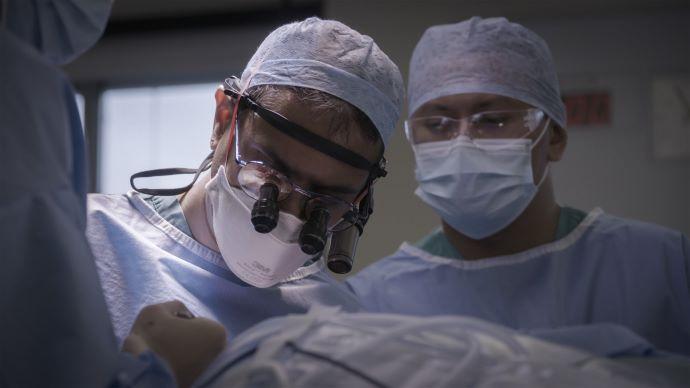Consultant plastic and reconstructive surgeon, Mr Animesh Patel, spoke out as the schools break up for summer and families enjoy more time outside and holidays in the UK or abroad.
Mr Patel, who is the Trust plastic surgery lead for head and neck cancer reconstruction, said the majority of his work is operating on patients with skin cancers, often carrying out complex surgeries on the face.
Despite increasing awareness of the dangers, he still finds himself operating on patients who admit to being exposed to the sun a lot, and also patients who use artificial UV tanning methods, such as sunbeds.
Although it is mostly fair-skinned people who tend to burn easily who are vulnerable, Mr Patel says people of all ethnicities need to take care, having removed skin cancers from patients with all skin types, including those with darker skin.
Many of the adult patients he sees mention having considerable exposure to the sun during their childhood, with some recalling cases of sunburn. He has also treated children, teenagers and young adults with skin cancers, so the advice is to take care whatever your age.
Mr Patel advises parents to be vigilant, explaining that children’s skin - and especially babies’ skin - is much more sensitive than adults, and damage caused by repeated exposure to sunlight can lead to skin cancer in later life.
Often overlooked is that UV light is able to penetrate cloud – so take sensible precautions even in cloudy weather – and remember that snow can reflect UV rays.
Equally, it is important to understand that adults and children do need some exposure to sunlight, particularly for vitamin D production, and vitamin D supplements are advisable for the under-fives.
Mr Patel said “Getting a tan is not necessarily safe or healthy, since a tan is the body’s way of trying to protect the skin from damage. At the same time, excessive UV radiation from the sun causes damage to the DNA in skin cells, and it is this damage that can result in cancerous changes developing in the future.
“So even though you packed the sun cream, do not rely on this alone to protect yourself and the family. Wear suitable clothing, a sun hat with a broad brim to protect the face and ears and spend time in the shade when the sun is at its hottest in the middle of the day. Don’t forget the sunglasses, regularly reapply the sun cream, especially if swimming, and remember to drink plenty of water to stay well-hydrated.
“The NHS website has excellent guidance on sun protection, and it is definitely worth spending a few minutes reading and understanding the principles of sun safety.”
In the last episode of ‘The Face Doctors’, on the TV channel Really this month, Mr Patel was seen successfully removing skin cancers from a patient.
Work on the Addenbrooke’s-based series, now available to stream on discovery+, started in April 2023 and resulted in an eight-part documentary following patients with life-changing conditions affecting the face, neck and head.
To learn more about skin safety visit https://www.nhs.uk/live-well/seasonal-health/sunscreen-and-sun-safety. For more about the TV series, now available to stream on discovery+, visit ‘The Face Doctors’ pages.



